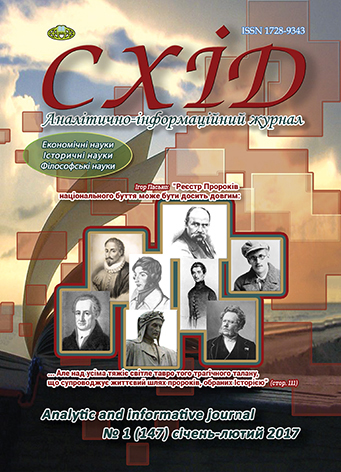The interpretation of paganish in the philosophical and religious ideas of ukrainian philosophers of 1870s-1960s: methodological reflections
DOI:
https://doi.org/10.21847/1728-9343.2017.1(147).97562Keywords:
"divine dialectics", "mystical sense", "religious logics", temporal rhythmAbstract
The object for analysis is the philosophical and theological idea of God in the structure of human, the universe and His names. The ideas of transfiguration and revelation (spiritual renewal) have also been discussed. Interpretation of paganism is based on legacy of Ukrainian thinkers (1870s-1960s), including but not limited to Sylvestr Gogotskyi, Markellin Olesnytskyi, Mykola Berdiaiev, Serhii Bulhakov, and Vasyl Zinkivskyi.
The use of different methods - functional, systemic, comparative, and hermeneutic, helped conduct a comprehensive analysis of the topic in view of different temporhythmical interconnection of (inter)religious communications and interdisciplinary space. A claim is made that the contradictions, which can become antinomies, are regular as they stimulate the search for truth through revealing truthfulness when expressing the ideas discussed.
A complex of processes that have emerged forms their so called "cascade" in which certain paradoxicality is caused by such term phrases as "mystical sense", "divine dialectics", "religious logics". Yet, the use of principles of integrity, free development and spiritual change, transcendence and harmony-symphony gives ground for substantiating their relevant use in modern science after decades of forced suppression. Simultaneously, new (author's) terms are put forward: "multiprocess simultaneity", "believe-in", "revelation studies". In this way a lacuna of necessary terms may be filled to a certain extent which will encourage diversification of heuristic activity and completeness of the analysis itself. Attention was also given to the connection between ideas analyzed and certain mentality features of Ukrainians, particularly within the context of "freedom revelation". One of the factors for direct functional contextual appropriation of the author's terms is systemic understanding of faith phenomenologization and a comprehensive analysis of the relation "God-human-God" which is multidimensional in its structure.
Objective regularity of interconnection between ideas analyzed is affirmed. Elements of synthesis are formed in their space and as a matter of course they harmonize and sometimes transform into the state of symphony.
Downloads
References
Berdiаiev, N. (1908), Origin of evil and sense in the history, in: Voprosy Filosofii i Psikhologii, Semtember-October, book 4 (94), Moscow, pp. 287-334. (rus).
Bulhakov, S. (1914), Transcendental Problem of Religion, in: Voprosy Filosofii i Psikhologii, September-October, book 4 (124), Moscow, pp. 580-652 (rus).
Bulhakov, S. (1914), Transcendental Problem of Religion, in: Voprosy Filosofii i Psikhologii, November-December, book 5 (125), Moscow, pp. 728-780 (rus).
[Gogotskyi, S.] (1872), Philosophical Lexicon, vol. 4: P.R.S., V Universitetskoi Tipografii, Kyiv, II р.+579 р.+IV р. (rus).
Zienkovskii, V. (1927), Freedom and Sovereignty, in: Put, April, book 7, Paris, pp. 3-22 (rus).
Zienkovskii, V. (1928), [Reviev of the book] : Wilfred Monod. Du protestantisme. (Series “Les religions”. Felix Alcan, 1928), in: Put, February, book 15, Paris, pp. 135-137 (rus).
Zienkovskii, V. (1997), The Foundations of Christian Philosophy, Kanon+, Moscow, 560 p. (rus).
Martcinkovska, D. (2015), Philosophical, theological and religious exspirience of the interpretation of credology’s problems, in: Visnyk Prykarpatskoho Universytetu. Filosofski i psycholohichni nauky, iss. 19, Ivano-Frankivsk, pp. 96-103 (ukr).
Oliesnitckii, M. A. (1888), From the system of moral theology, in: Trudy Kiievskoi Dukhovnoi Akadiemii, book 2, Kyiv, pp. 163-205 (rus).
Pecheranskyi, I. (2016), The connection between political philosophy and ideology in the contex of Ukrainian conservatism, in: Hileia, iss. 113(10), Kyiv, pp. 285-290 (ukr).
Preobrazhenskyi, S. (2010), Out of Christian components in the consiousness of the Ortodox believer: autoref. of the dissertation for the degree of Doctor of Thilosophy in the specialization 09.00.11 “Religious studies”, Kyiv, 20 p. (ukr).
Downloads
Published
How to Cite
Issue
Section
License
Copyright (c) 2017 Zуnovij Timenyk

This work is licensed under a Creative Commons Attribution-NonCommercial-NoDerivatives 4.0 International License.
1. Authors bear responsibility for the accuracy of facts, quotations, numbers and names used.
2. Manuscripts are not sent back.
3. The publisher does not always agree with the authors' opinion.
4. The authors reserve the right to authorship of the work and pass the first publication right of this work to the journal under the terms of a Creative Commons Attribution-NonCommercial-NoDerivatives 4.0 International License. This license allows others to distribute (copy) the published work for non-commercial purposes, provided there is mandatory attribution to its authors and a link to the first publication in our journal.
5. The authors have the right to conclude separate supplement agreements that relate to non-exclusive work distribution in the form in which it has been published by the journal (for example, to upload the work to the online storage of the journal or publish it as part of a monograph), provided that the reference to the first publication of the work in this journal is included.

